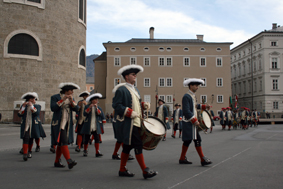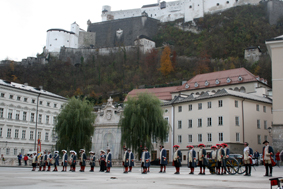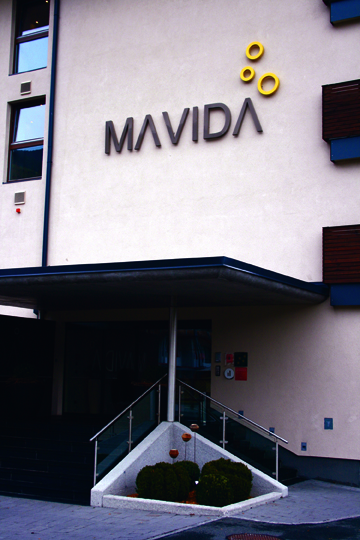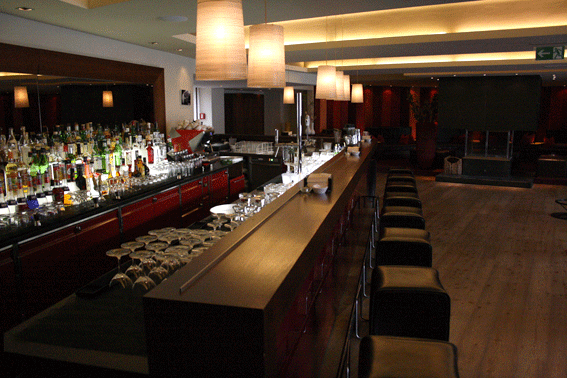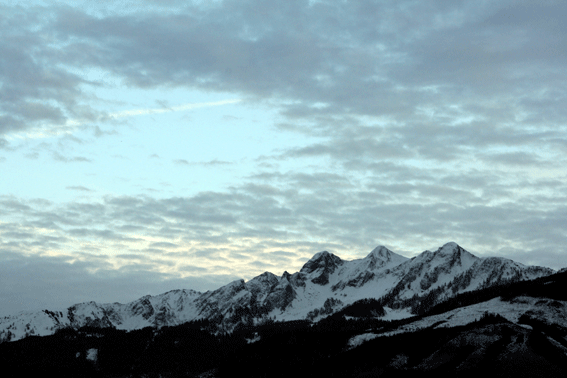It’s Saturday morning and Chapter Square – the Kapitelplatz – is alive with the sound of music. Not the music of the von Trapp family, nor the music of Salzburg’s most famous son, Mozart – in Mozartplatz, a statue of him stands tall, overlooking a winter ice rink and a huddle of wooden market stalls selling Christmas decorations, glasses of gluwein, spicy bockwursts and mustard-topped frankfurters….
But for once this is not a Mozart moment. A rat-a-tat of marching drums and pipes drifts across the square, followed by the clip-clop of shod hooves and the shuffle of polished boots. All becomes clear when 100 men enter from a side street, wearing immaculate uniforms, tricornes on their heads, frilly shirts and socks pulled up to their knees. Cavalry and infantry come to a halt, some lining up in front of the grand baroque cathedral, the Dom, others on the opposite side of the square with the 900-year-old Hohensalzburg Fortress as an imposing backdrop. And then the small contingent from the village of Zell am See raise their rifles and let off a volley into the crisp sky.
Later, as I head out of the city towards Zell, I ask my taxi driver about the troops. “I’m not sure,” he says. “There are so many occasions like this in Salzburg – any excuse for the men to get out their lederhosen and play oompah music!”
Zell is an hour-and-a-half’s journey from Salzburg. It’s a pleasant transfer through pretty passes. Looming above are high peaks, ice and snow etched on the upper slopes, the result of the first dusting of the winter season.
At the Zeller See, a beautiful alpine lake, my driver pulls away from the shore road into surroundings that are unexpectedly suburban, to drop me off at the Mavida Balance Hotel.
‘Ma vida’ (in Spanish it means to adopt a certain attitude to life – to enjoy it and to celebrate food and drink) is the region’s first design hotel. It seeks to be an alpine sanctuary, a place to restore personal harmony. And, it has to be said, despite its rather utilitarian appearance and the car park on the doorstep, it does this well.
Unlike many hotels in the region, there’s no cutesy rustic Alpine theme, but the sharp angles and warm tones that characterise the interiors of many of the Design Hotels group, of which Mavida is a part. The design is minimal, the bedrooms small and compact, but with pillows the size of hay bales and cosy beds positioned so that you look out of the floor-to-ceiling window towards the snow-capped Schmittenhöhe mountain, framed by curtains like a theatre stage.
‘Relaxation by design’ is Mavida’s mantra, and there’s a ‘sleeping menu’ in the room, should you prefer a sturdier mattress or a different softness of pillow. The options already provided seem comfortable enough: I slip into a deep sleep for 12 hours straight. After this hibernation, I’m fortunate that the Mavida has such generous breakfast hours, allowing guests to wander in until 11:30 am. I take full advantage of this leisurely start to the day, happy to adopt my own interpretation of the hotel’s underlying premise of ‘balance’.
But there are plenty of things to do should you feel more energetic. The hotel runs a daily programme of indoor and outdoor activities: from Nordic walking beside the lake and snowshoe hiking in the foothills, to Pilates, yoga and circuit training classes. Personal horoscope sessions are another option, but I decide to follow my own path, ambling along the 3-kilometre-or-so trail through farmland to the hotel’s private beach area.
The path is a cross-country ski trail in winter and makes for a pleasant Sunday stroll, passing other walkers who smile and say ‘Grüß Gott’ in greeting.
Back at the hotel and it’s time to check out the spa. I’ve had a crick in my neck since the flight from London and a 50-minute full-body massage soon fixes that, leaving me feeling revitalised and relaxed. Massage is, however, but one of the many treatments that earned the hotel the Gala Spa Award 2009 for its ‘innovative spa concept’, the first time this prestigious international prize has made its way to Austria. There are light, sound and even weightlessness treatments, plus two saunas, an outdoor and an indoor pool with waterbeds for relaxation, and a private spa suite for two.
In the street outside, the bells of a small church sound faintly every 15 minutes, a gentle reminder that time is passing, even if it seems so much longer here than normally. This tranquillity continues with afternoon ‘calm time’ in the lobby and stylish lounge bar. Although it’s not busy during my stay I imagine the latter – laid out around an enticing 360-degree open fire – being a super place for the après-ski crowd to thaw off, sip cocktails and share stories of their day on the slopes, before moving up a floor to the gourmet restaurant to carry on their merriment.

Duncan Mills is the Deputy Editor of Traveler magazine, one of
the UK’s leading travel titles, and a founder and Director of a London-based contract publishing company, which is also involved in organizing the Travelers’ Tales Festival, an annual celebration of the very best travel writing and photography. An award-winning journalist, talented photographer and avid traveler, Duncan has visited more than fifty countries on six continents.

